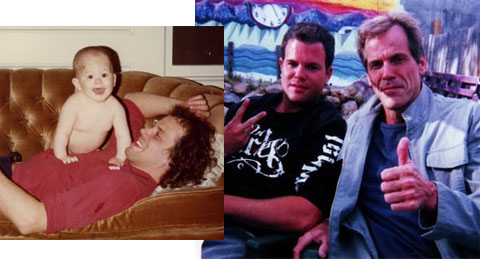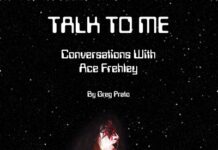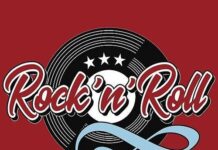by Alex Sheldon
Many of my most colorful memories from early childhood are anchored in musical experiences with my parents: Playing on the mini drum kit my dad bought for me when I was four years old; sitting at the foot of my mom’s piano as she practiced pieces by Beethoven and Mozart; tagging along with dad on trips to the recording studio; the sounds of the Police, Michael Jackson, Stevie Wonder, David Bowie, the Pointer Sisters and other 70s and 80s royalty echoing from the mountains of cassette tapes and vinyl in our house. Given these early introductions, I suppose it isn’t any wonder that I had a strong gravitation towards music and eventually found my way to an instrument.
By the time I was a teenager, I was awed and inspired by my dad’s — Stanley Sheldon — music career. A successful bass player who has recorded and toured with Peter Frampton, Tommy Bolin, Lou Gramm and Warren Zevon, my father’s history assumed a mythical status for me. My friends were always impressed when “Do You Feel Like We Do” or “Show Me The Way” graced the airwaves or when I would produce old photos, records and memorabilia that were handed down to me.
As aspiring musicians, it didn’t get more impressive than the things my dad had achieved. That was “success” as far as we were concerned, so like the son of a blacksmith in epoch’s past, I soon felt a drive to carry on the family trade. I picked up that first haggard Peavey bass in a used music store. After 17 years and various bass guitars later, I still love playing and writing music. My gravitation to the lower frequencies came out of an inner desire to be like my dad, to relate to him on his own turf and to make him proud of me. I also saw mastering the bass as a way to stand out in rock music.
During the mid 90s, when countless teenage boys picked up imitation guitars with dreams of being the next Kurt Cobain or Dimebag Darrell, being creative with a bass guitar was a way to be different. Choosing the bass wasn’t purely an artistic statement of rugged individualism though; it was also a practical necessity. With my three best friends picking up the guitar at that time, we were in dire need of someone who could play anything BUT a guitar.
As cool as it was to have a famous musician for a father, my relationship with him was also complicated and painful at times. My parents got divorced when I was seven years old. The demise of the marriage was due to my dad’s increasing struggle with drug abuse, and it would be the undoing of his music career during that era. Mom and I left Westchester, New York in 1985, landing in Northern California where my aunt and her family lived. Dad returned to his home State of Kansas to work with his addiction and get himself back on his feet.
During the years I spent growing up in the Sierra Nevada foothills, I was flown out once a year to visit my dad for one to two weeks. I was always happy to spend time with him, but it was a stretch to consider him a big part of my life. We really didn’t know each other well and in the time that we were apart, there were times when I felt like he was missing from my life. There were also times when I was angry and felt he had utterly abandoned us. On one level I understood the difficulties he faced in his life, but on another, I didn’t care.
 Stanley Sheldon and Peter Frampton
Stanley Sheldon and Peter Frampton
My father would eventually conquer his addictions and rebuild his life. He started playing music actively again, and he enrolled in college and received Bachelor of Arts and Masters Degrees from the University of Kansas. It was around the age of 17 that I started to seriously talk music with my dad on visits to the Midwest. We didn’t see eye to eye on some things and obviously there was a generation gap, but we began to accept each other’s shortcomings in the music taste department.
I turned him onto the finer points of Primus and stressed the technicality of metal groups like Megadeth and Pantera, and he would preach the gospel of Motown, jazz, funk and the blues. He gradually started to teach me theory and technique and give me tips on my playing. We would listen to the sounds of Jaco Pastorius, James Brown and Marcus Miller, and take turns playing along on his Music Man Stingray bass. New sounds filled my mind and I expanded my palette into new genres and styles of playing.
I look back on these times and see that this was his way of relating to me and imparting his knowledge of what mattered in the world to his only child. Even though he wasn’t able to provide financially oftentimes or be the stable figure in my life that he and I both wanted him to be, he could connect with me in the appreciation and love of music. Pops and I have come a long way in our relationship. There’s never a shortage of things to talk about on the music front. I still have difficulties with the past and with his absence during portions of my life, but I also have come to accept and appreciate the relationship we do have.
My dad is not surprisingly a big supporter of my musical endeavors. I write, record, perform and have played in bands of my own over the years and I never fail to get honest (and sometimes harsh) feedback from him. We talk on the phone and share new artists we like, great live shows we have seen, and talk shop about bass gear. I have yet to achieve the success my father has found in the business, and as children of famous artists know, the shoes can be big and hard to fill. As Pops says, I shouldn’t compare; times are different, the industry isn’t the same as when he was coming up, and there just isn’t the same kind of opportunity in the business.
Although much of that is true about the music industry today, the reality is that my path has been different than my dad’s and uniquely my own. At the age of 34, I have come to understand that music will always be a part of my life, regardless of the level of success I achieve on any commercial level. It used to be an all-or-nothing view for me but I’m learning to see that success is a purely subjective idea and has different meaning for different people. I have begun to be at peace with my relationship to music, my father’s role in my life and our respective musical journeys.
At 62, dad has come full circle in many ways during this stage of his life. He has been sober and healthy for more than 25 years now and his tenacity and ability to recover from the deepest depths of addiction is an inspiration for me. In 2011, he was asked to rejoin Peter Frampton’s band for the 35th anniversary tour celebrating the 1976 release of Frampton Comes Alive, and he is now a member of the band again after a hiatus of more than 30 years.
As the only two surviving members from the original lineup, Peter and my dad have forged a deeper relationship and left behind many of the issues that drove them apart in the early 80s. In many ways it’s reminiscent of our relationship and the things we have gone through as a father and son. I’m excited to see where music will lead us both in the years to come, wherever that may be.
 Alex Sheldon
Alex Sheldon




















